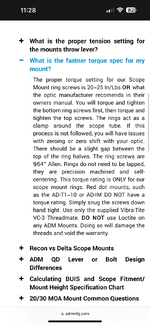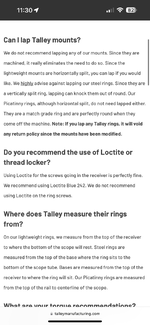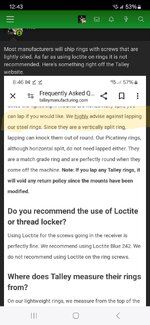Aaand, we’re right back at 1) they are clearly trying to cover their asses, they explicitly say as much.
2) their rationale is possible scope damage from a wet torque…but the screws come oiled which, unless you mount them de-greased, results in a higher torque in the first place than youd get with loctite anyway.
Cant have it both ways, so which is it? Is it ok to mount the screws as they come out of the box, which results in a wet torque? Because if so, loctite has to be ok too.
Or is any wet torque too high and screws must be degreased for mounting, in which case everyone who doesnt use degreased screws will obviously eff up their scope?
Look, Ive written dozens of product manuals for technical stuff like this in other industries. The directions almost always have CYA language in them that isnt transparent or necessary, its just trying to give them an out for the most stupid, egregiously dumb stuff that people do out of ignorance. With some of the most popular scopes recommending to mount rings at 15 inlb, its no wonder.
I’m left with: after following the recommendation, there are plenty of people that doesnt work for. And when you take the time to dig into the recommendation, it doesnt hold nearly as much water as it should. So the evidence says to me its a CYA recommendation based on the lowest-common-denominator of scopes mounted without a torque wrench. Given the choice between understanding the recommendation and everything that goes into it, and what to compare it against, and making my own decision based on the actual situation to address the problem at hand even if that goes against the recommendation…versus living with scope rings and bases that come loose always at an inconvenient time…I know which choice makes more sense for me.
We’re going in circles.



